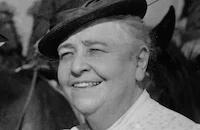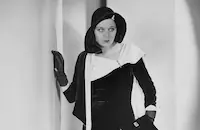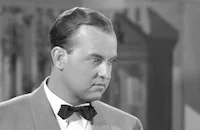Hot Saturday

Brief Synopsis
Cast & Crew
William Seiter
Cary Grant
Nancy Carroll
Randolph Scott
Edward Woods
Lillian Bond
Film Details
Technical Specs

Synopsis
In the small town of Marysville, young people spend hot Saturday nights at Willow Springs, a lakeside dance hall. Romer Sheffield, a wealthy city man who has a summer home on the lake, becomes infatuated with Ruth Brock, who works at the town bank owned by Mr. Ed. W. Randolph. In order to get closer to Ruth, Romer hosts a party for her friends on Saturday evening, July 23rd. Although Ruth arrives at the party with Connie Billop, she spends a few innocent hours alone with Romer, then returns to find that everyone has left for Willow Springs and joins them with Connie. When Ruth and Connie go for a boat ride, she refuses to neck with him, and he leaves her stranded on the beach. Walking through the woods, Ruth finds Romer's house and spends a few more innocent hours with him. When jealous Eva Randolph, the banker's daughter, sees Ruth arriving home in Romer's car, she starts a rumor that Ruth spent the night with Romer. Sneaking through the house, Ruth finds Bill Fadden, a childhood friend, in her kitchen. Bill is about to leave to conduct a geological survey in nearby Indian Cave. Over the weekend, a scandal builds, which ruins Ruth's reputation, and on Monday morning, Mr. Randolph fires her, calling her an immoral woman. Although her father defends her, Ruth's mother believes the gossip and is more worried about the family's loss of income than Ruth's feelings. Ruth runs away in a rain storm to Bill's camp, where they make plans to marry. While the gang celebrates at Willow Springs, Romer, whom Eva invited, asks Ruth to dance, but leaves graciously when he learns she is to be married. Bill, meanwhile, overhears Connie talking about the scandal and is furious that Ruth neglected to tell him about Romer. Realizing Bill does not trust her, Ruth leaves with Romer. The next morning she arrives home and breaks her engagement with Bill, admitting she finally did spend the night with Romer. As Ruth and Romer leave for New York, he promises to marry her.

Director

William Seiter
Cast

Cary Grant
Nancy Carroll

Randolph Scott

Edward Woods
Lillian Bond
William Collier Sr.

Jane Darwell
Stanley Smith

Rita La Roy
Rose Coghlan
Oscar Apfel
Jessie Arnold

Grady Sutton
Crew

Photo Collections
Videos
Movie Clip



Film Details
Technical Specs

Articles
Hot Saturday
In this movie, a variant on the "fallen woman" genre, Ruth (Nancy Carroll) is an all-American gal who, after putting in her hours at the town bank, enjoys her weekend fun at the Willow Springs dance hall. That's where she meets Romer (Cary Grant), a wealthy city gentleman who, smitten with Ruth, invites her and friends to a late night party at his lakeside summer home. Romer's a perfect gentleman, but bitter gossips assume it can only mean one thing when a strange man drives Ruth home in the morning. Fired from her job and shunned by the town, poor Ruth has no allies against the slander: even her own mother (Jane Darwell) is more worried about the family reputation than her daughter's feelings. Can Ruth salvage her reputation in her small-minded community with a quickie marriage to a childhood friend (Randolph Scott)? Or should she dismiss all the gossips and follow her heart back to Romer instead?
Screenwriter Josephine Lovett, who also penned the Joan Crawford star-maker Our Dancing Daughters (1928) knew how to create virtuous-yet-vivacious flapper roles that flattered the new generation of ingénues like Nancy Carroll. It didn't hurt that a lax production code allowed a critical portrait of small-town America as judgmental and money-obsessed ("Immoral women shouldn't work in banks, you know. They might corrupt the young dollar bills.") as well as honest moments like when Ruth, angry that her younger sister stole her good lingerie, pushes her down on the bed and pulls the offending panties off of her.
While it seems like a foregone conclusion to cast Grant as the most appealing man in town, the "Cary Grant" we know -- graciously virile, well-dressed, oft perplexed but never flustered -- had not yet been cemented by the neophyte actor. (The Awful Truth (1937) is the first fully-formed appearance of the familiar persona from The Philadelphia Story (1940) and North By Northwest (1959)). Gary Cooper had originally been cast as the love interest, with Grant as the childhood friend, but when Cooper dropped out, director William Seiter bumped Grant up to star billing and hired Randolph Scott -- the tall and handsome former college football star and heir of a well-to-do Southern family -- to fill the role Grant had departed.
This serendipitous casting shuffle brought Grant and Scott together into instant affinity. Even though from different backgrounds, the two men shared a love of drink and cigarettes, fancied dressing well, were canny about money (some say cheap) and instantly got each other's wry sense of humor. Historians cannot decide on a definitive answer about whether the two men were in fact romantic partners, but it is incontrovertible that soon after meeting, they set up a cozy home together in an apartment in the Hollywood Hills. (One biographer noted that the more austere Grant cared nothing for furnishings, so the men decided on a division of labor wherein Scott was in charge of interior design, while Grant was responsible for keeping both men in nice suits and top-shelf booze.)
Promotional photos of Grant and Scott enjoying their "bachelor apartment" exist, and as unreliable as promotional photos can be about the truth of movie star's lives, the men look genuinely happy as they sun themselves poolside or tuck into breakfast together. Grant and Scott lived together on and off for a decade, an arrangement that outlasted Grant's brief and unhappy marriage to Virginia Cherrill in 1934 -- a marriage that may have been demanded by his employers to deflect uncomfortable attention from his contented home life with Scott.
Despite Hot Saturday not doing well at the box office, and being panned by critics (with the New York Times pointing out how the behavior of its characters was more in keeping with the Jazz Age than the newly sober Depression) Grant's star still remained on the rise through the 1930s. Mae West -- always a keen judge of male sex appeal -- soon cast him in She Done Him Wrong (1933) and I'm No Angel (1933), roles that brought him even more swooning acclaim. But regardless of the individual artistic merits of Hot Saturday, the opportunities it presented in Grant's career -- and his personal life -- mark it as an essential turning point in the making of Cary Grant, movie star.
Violet LeVoit
Sources:
A.D.S. "Hot Saturday (1932) Malicious Gossip." The New York Times, November 5, 1932
Eliot, Marc. "Cary Grant: A Biography". Three Rivers Press, 2005

Hot Saturday
Hot Saturday - Cary Grant, Nancy Carroll & Randolph Scott in the Pre-Code Drama, HOT SATURDAY
The Code offers this reason for the taboo material: "The effect of nudity or semi-nudity upon the normal young man or woman, and much more upon the young and upon immature persons, has been honestly recognized by all lawmakers and moralists."
Those words could easily have been written by almost any of the older townspeople in Paramount's Hot Saturday (1932), a wonderfully entertaining little film that has just been exhumed from obscurity by Universal Home Entertainment in its new Pre-Code Hollywood Collection of DVDs. Not only does Hot Saturday violate all the above rules, it is actually about repression and the terrible effects it can have on individuals and communities. The picture, directed by William Seiter, doesn't only titillate for the sake of being outrageous (though it does so on occasion!) -- it uses the frank sexual material in the service of a surprisingly poignant theme (jumping to conclusions and unfairly judging others) which ultimately feels modern and timeless. It's also terrifically acted by a very young Cary Grant, Randolph Scott, and appealing early talkie star Nancy Carroll.
The story centers on the young adults of a small American town who work at a bank and other normal jobs, and who spend their off-hours drinking bootleg liquor, dancing, kissing, and carousing. Basically, sex is on everyone's mind. The young people want it and try to get it, and the old people judge it and try to stop it (meaning they think about it just as much). Young bank employee Nancy Carroll is caught between the affections of co-worker Edward Woods and rich playboy Cary Grant, who has a fabulous car and a stunning summer house on a nearby lake complete with Chris-Craft boat. Woods is charmless and crude, and Grant is a sophisticated rake "considered too dangerous for local consumption." After unsuccessfully hitting on Carroll (while another woman sits fuming in his car outside) Grant invites everyone to a Saturday party at his lake house as a way of getting near Carroll again. Carroll attends with Woods; Grant steals her away and charms her; then everyone except Grant goes to a nearby dancehall at night.
When Woods tries to date-rape her, Carroll fends him off and makes her way back to Grant's house. She spends a few innocent hours there before Grant sends her home in his chauffer-driven car. She is seen arriving in said car, and before we know it, the false gossip that she slept with Grant has spread to all corners, with the town trying, judging and sentencing her in the blink of an eye. She loses her job. She loses her social standing. The effect is vicious. Randolph Scott pops up as her childhood sweetheart, all virtue and good manners, but eventually even he turns on her.
It's here that Hot Saturday becomes truly poignant; the scenes of Carroll searching for someone, anyone, who will believe the truth are genuinely touching and impressive. (Needless to say, the only one she can turn to is Grant himself; the gossip turns her back toward the very man she "should" keep away from.) Carroll had been a top Paramount star, but her career was now on the wane. Even so, she's terrific here, and it's easy to see why she connected with audiences. She has a quality that really lets an audience in.
But it's 28-year-old Cary Grant who gets top billing for the first time in his career, and it's equally easy to see why Paramount thought they had a star in the making. This was Grant's sixth credited picture, and he is absolutely winning and dapper, with obvious star quality even if he still seems a little unsure about how best to physically interact with the camera. Grant does well in the role though his character is not given a chance to change much.
What's most striking about Hot Saturday is that even though it's a film of its era, with the clothes, cars, music and slang of the time, the characters are quite timeless in their actions, desires and thoughts. These are not the types of characters one "only sees in the movies," enacting ridiculous or melodramatic plot points; these are people who act and react in ways that are more believable and relatable even today. Jealousy provokes gossip, which combined with repression results in social punishment. It all still happens, just with different surface details.
Above all, Hot Saturday is genuinely funny and fast-moving. While it's filled with sexual innuendo, it has two especially eyebrow-raising moments. One is the jaw-dropping sequence where Nancy Carroll finds her sister wearing Carroll's underwear and then proceeds to wrestle the underwear off of her, and the other is a scene late in the film where it becomes obvious (to us and to Carroll) that Randolph Scott has taken off literally all her clothes and wrapped her in a blanket to help her recover from near-hypothermia. A similar scene in Vertigo doesn't show Kim Novak's underwear hanging by a fire, as this film does -- which is probably why Hitchcock got away with it in Code-enforced 1958.
In the supporting cast are Lillian Bond (very sexy as a gossip-spreading friend), Jane Darwell (a hoot as Carroll's mean mother), and William Collier, Sr. (a delight as Carroll's kind father). Grant and Carroll appeared together in one more film, The Woman Accused (1933), and it was during the making of Hot Saturday that Grant and Randolph Scott became good friends and eventually roommates. They appeared together in one further film: My Favorite Wife (1940).
Hot Saturday was remade as Nice Girl? (1941), starring Deanna Durbin. In a sign of the Code at work, Durbin ends up with the good boy, which is not the case in this film!
Universal Home Entertainment has packaged the film in a box set of six pre-Code Paramount movies, all of which are worth seeing. There are no extras save for a brief featurette about the Production Code and a welcome copy of the document itself. Picture and sound quality are very good. The set is quite simply a must for any movie fan.
To order Hot Saturday (which is only available as part of the Pre-Code Hollywood Collection), click here. Explore more titles from the TCM Vault Collection here.
by Jeremy Arnold
Hot Saturday - Cary Grant, Nancy Carroll & Randolph Scott in the Pre-Code Drama, HOT SATURDAY
Quotes
Trivia
Notes
Variety commented that this film has "no A name draw in its cast."














